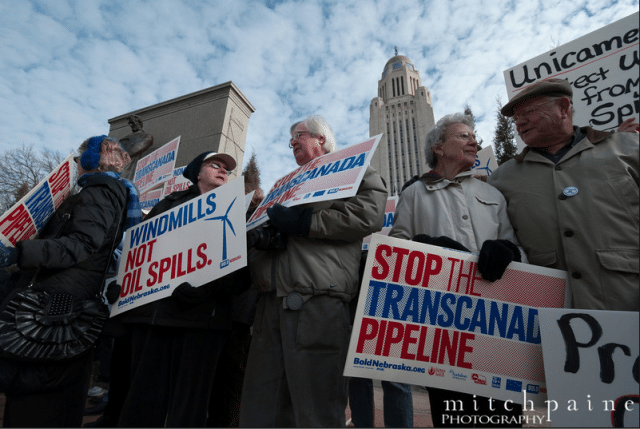Everywhere you look up and down the proposed Keystone XL tar sands pipeline, there seems to be a conflict of interest. Over the past couple of weeks, my colleagues at OnEarth have spotlighted a couple of them.
First, there was Scott Dodd’s exclusive look into Susan Rice’s finances. Rice, who is thought to be atop the list of candidates for Secretary of State if and when Hillary Clinton steps down, is heavily invested in TransCanada and other companies doing business in the tar sands.
Remember that the Secretary of State will be responsible for ultimately approving or denying the permit for the pipeline to cross from Canada to the United States.
Rice’s financial holdings could raise questions about her status as a neutral decision maker. The current U.S. ambassador to the United Nations, Rice owns stock valued between $300,000 and $600,000 in TransCanada, the company seeking a federal permit to transport tar sands crude 1,700 miles to refineries on the Texas Gulf Coast, crossing fragile Midwest ecosystems and the largest freshwater aquifer in North America.
Beyond that, according to financial disclosure reports, about a third of Rice’s personal net worth is tied up in oil producers, pipeline operators, and related energy industries north of the 49th parallel – including companies with poor environmental and safety records on both U.S. and Canadian soil. Rice and her husband own at least $1.25 million worth of stock in four of Canada’s eight leading oil producers, as ranked by Forbes magazine.
That’s just the tip of the iceberg in this report, which you should absolutely read in full.
Of course, Secretary Clinton, too, already has some uncomfortably (some would say unethically) close ties to TransCanada, which DeSmogBlog uncovered in detail late last year.
OnEarth recently exposed another equally brazen conflict of interest for the controversial pipeline. The State of Nebraska hired an Omaha-based company to run the environmental assessment for the project. The only problem, as Ted Genoways reported: HDR Engineering has extremely close business ties to TransCanada, having twice been hired by the company directly for big contracts.
What’s more, HDR’s own website says one of its missions is to “help oil and gas clients overcome the challenges of increasing government regulation and oversight and harsh physical and political climates, and exploit those opportunities.” Among the services its provides to pipeline companies is “helping them through the environmental planning and permitting process.” HDR promises “one-stop shopping,” so these companies “can focus on what they do best – delivering oil.”
Does that sound like a company that can objectively produce an environmental assessment of a pipeline, or one that will rubber stamp a review for a deep-pocketed client?
Genoways’ report from the ground in Nebraska is startling and illuminating, and you should definitely go read it in full.
As these conflict of interest stories surrounding Keystone XL pile up, one thing is becoming abundantly clear: none of the parties involved in making the actual decisions about whether or not this pipeline should be built are in any way unbiased.
The people of Nebraska and other states along the pipeline’s proposed route have spoken – as have climate advocates and tar sands blockaders – but these voices are being summarily dismissed by the empowered parties that have personal and professional stakes in the development and shipping of the toxic time bomb that is tar sands bitumen.
Subscribe to our newsletter
Stay up to date with DeSmog news and alerts







